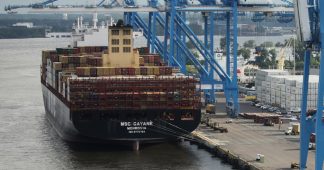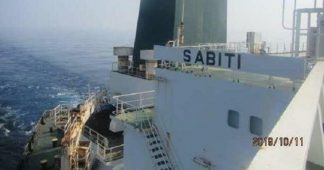5 Aug, 2020
The explosion that devastated Beirut has been linked to a mishandled ammonium nitrate cargo confiscated from a foreign ship. Now a former crew member tells RT the vessel, owned by a dodgy businessman, was a disaster in the making.
Some 2,750 tons of ammonium nitrate – a highly explosive fertilizer – went up in a terrifying blast in Beirut on Tuesday, Lebanese officials have said. The mushroom-shaped explosion left a wasteland where the city port stood, turning the surrounding buildings into ruins and killing more than 100 people. Thousands of others have been injured in a kilometers-wide radius. Personnel from the port authorities have been arrested while a probe has been launched into the mishandling of the dangerous material. But how did this ludicrously large cache end up in the Beirut port in the first place?
The ammonium nitrate cargo has been confiscated from the arrested vessel MV Rhosus, Lebanon’s Supreme Defense Council has confirmed. The ship is said to have entered Beirut port in September 2013 due to technical difficulties and was eventually banned from continuing its voyage. A deeper look into its history shows, however, that the vessel was a floating disaster, and trouble was brewing on it for quite some time.
According to the MarineTraffic tracking portal, Rhosus was built in 1986 and has been through quite a number of owners. Its recent history began in 2012 when it was bought by Teto Shipping – a company registered in the Marshall Islands and owned by a Cyprus-based, Russian-born businessman, Igor Grechushkin – just about a year before it was seized by the Lebanese port authorities. The company itself was formed that same year and Rhosus appears to have been its only vessel. It is now becoming clear, however, that the ship could hardly have been called a worthy vessel, even then.
‘A bitter sailing experience’
The ship sailed under the Moldovan flag, and its crew was made up mostly of Ukrainians and Russians. The chilling messages they left on Russian-language forums dating back to 2012 paint a picture of nightmarish work conditions from the moment they took on the job. Facilities in a dismal state, extremely low salaries and back pay issues are constantly mentioned in the posts, which mostly served as warnings for fellow sailors considering contracts with the company.
“Those, who worked [on the Rhosus] should be awarded ‘Hero’ titles,” one sailor wrote, in a message screenshotted by Telegram news channel Baza. “The ship has no refrigerating chamber” to store foodstuffs and even the master’s cabin had no sanitary conveniences, the message reads.
RT has contacted a former employee of Teto Shipping, who served onboard the ill-fated ship – and his account appears to perfectly support the crewmen’s allegations.
Semyon Nikolenko, who was hired as an electrical engineer for the MV Rhosus crew some time in 2012, says both the vessel and the company management were “not good.”











